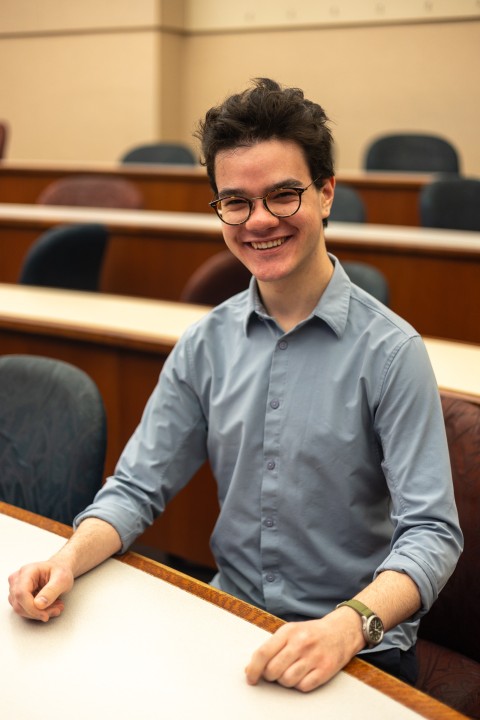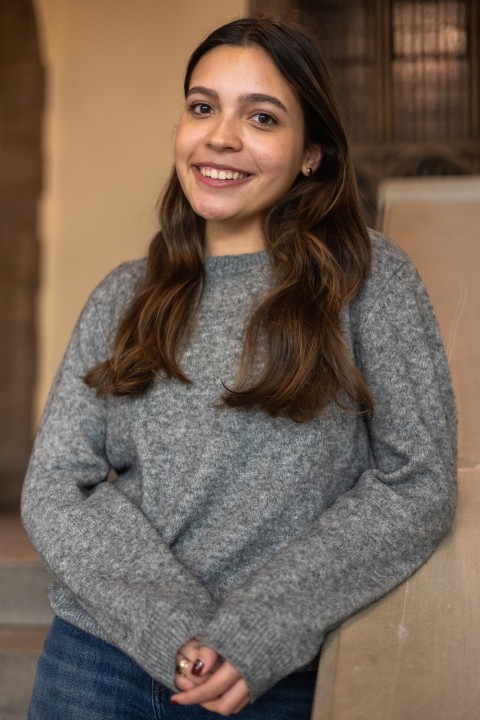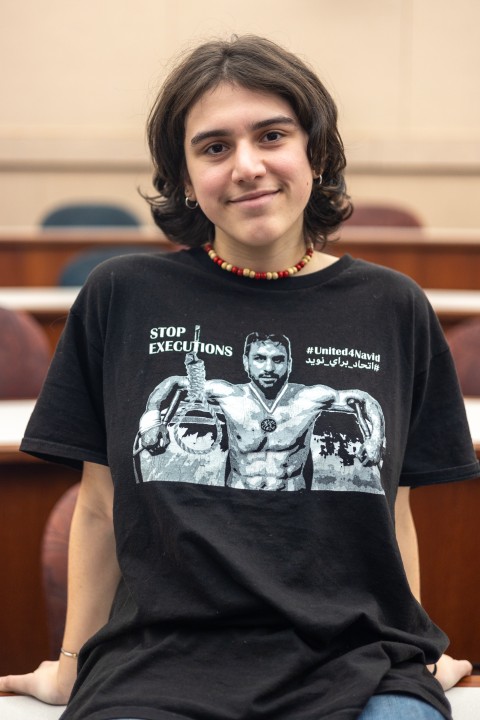UChicago’s Undergraduate Student Government (USG) is responsible for working with the University’s administration, handling Recognized Student Organization (RSO) funding and generating ideas and proposals that will improve student life. College Council Representatives, the legislative body of USG, are voted into their positions by their classmates.
Meet three of the College Council Representatives who help make it all happen.
Aaron Wineberg, Representative Class of 2024
Aaron Wineberg is a member of the Committee of Academic Teams, which funds academic RSOs. He is originally from Wilmette, Ill., is majoring in anthropology, and is also President of UChicago Kehillah, the Israeli Cultural Society, and a Model United Nations Chair.

Wineberg says his experience as a first-year student during COVID informed his interest in student government, in particular the importance of building a positive campus environment.
“After joining in my first year, I realized there were simple ways to add value to campus life that just needed initiative,” says Winberg. “For example, we have a free textbook exchange that most students are unaware exists.”
Much of the Council’s day-to-day work involves proposing resolutions on a variety of topics and working with administrators to advocate for the student body’s interests.
For example, Wineberg leads an informal task force that aims to improve the library experience on campus. The task force gathered student feedback and found that students wished the Regenstein Library would remain open later, a suggestion that they brought to University administration.
This proposal was ultimately successful, with a pilot program in which the Regenstein Library extends its closing time from 12 a.m. to 4 a.m. during midterm exams. Wineberg is working with the library to find a permanent solution.
“Administrators truly want direct access to the insights of the College Council representatives to better understand the evolution of student life priorities,” said Wineberg.
Wineberg also stressed the many opportunities for all UChicago students—not just those elected to USG—to have their voices heard and to contribute to USG’s work to improve student life.
“Not many people realize how many roles there are on committees,” says Wineberg. “Ultimately, a lot of USG’s work has been achieved through committees, including the incredibly important role of approving and funding the 400+ student groups. We need students to be involved—there are more opportunities than there are students to fill them.”
Andrea Pita Mendez, Representative for the Class of 2027
Though she is only a first-year student, Andrea Pita Mendez is no stranger to student government proceedings. She has been involved in student government since middle school, and has gone on to be involved at the class, school, school-district and state level, having grown up in Miami.

“It grew from a way of being able to express myself into something I was genuinely passionate about,” says Mendez, who hopes to pursue a career in law using the skills she has learned along the way. “It’s more than just being in touch with your classmates and the school community: student government fosters compassion, critical thinking, and self-initiative.”
This led her to USG, where she is Chair of the Academic and Career Affairs Committee. Mendez is also involved in several law-related RSOs, including the Undergraduate Law Magazine and the Mock Trial Team.
As a College Council Representative, Mendez emphasizes the importance of communication with her peers, connecting members to the right people to draft resolutions, working with other representatives to produce solutions and liaising with administration and faculty.
The collaborative nature of student government is what Mendez says she enjoys most about her work.
“I used to be really shy, and Student Government allowed me to grow a lot more into myself and enjoy talking and listening to people,” says Mendez. “Meeting new people, helping them, interacting with them is so crucial to the world and our work.”
Darya Foroohar, Representative for the Class of 2024
Darya Foroohar is a member of the Health and Wellness Committee (HAWC) and the Sports Club Fund, but she may be most well known for her promotional signs that she created to get elected to USG.

“I was a member of my high school's student government, so I immediately ran first year but was not elected,” Foroohar says. “During that fall election cycle, though, I had so much fun making provocative posters and silly slogans ("life is pain. vote for Darya") that I vowed to run each year in order to make more posters, even if I didn't have a chance of winning. I ended up winning a position for second year in the spring elections of first year ("hot girls vote for Darya"), and I've been here ever since.”
This year is Foroohar’s third as a member of USG. She is also involved in the Contemporary Literary Arts Lab on campus, an outreach intern for UChicago Admissions, and the captain of UChicago’s ultimate frisbee B team.
As part of the Health and Wellness Committee, Foroohar has helped with programs like a DivaCup training, initiatives to spread information about mental health resources, and an open mic to raise money for the Mental Health Fund.
“[The open mic] was not only a good way to raise money for mental health resources on campus and educate attendees about the services HAWC provides, but a place for students to express their creative sides and enjoy performances,” says Foroohar. “Making USG initiatives fun and engaging for students is very important to both our lasting influence over the student body and our reputation with administrators, who often look for qualitative measures of success.”
Foroohar also points to the qualitative impact of other initiatives of which she is quite proud, such as working with local vendors that serve food at student cafes to list ingredient and allergen information on the boxes.
Both the greatest challenge and the greatest opportunity of USG, she said, is the amount of collaboration and work that goes into each resolution.
“It can take a long time for a resolution to go through the process of editing and being voted on to actually take effect, but the reward at the end is worth it,” said Foroohar. “Also, most of the nitty-gritty stuff gets done in individual committees, which anyone can apply to join. In fact, the more students express interest in a policy or issue, the more likely it is that administration will prioritize it. Student involvement in our programming is essential, and we take student suggestions very seriously.”